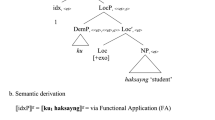Abstract
The complement of transitive intensional verbs, like any nonreferential complement, can be replaced by a ‘special quantifier’ or ‘special pronoun’ such as something, the same thing, or what. In previous work on predicative complements and that-clauses I argued that special quantifiers and pronouns introduce entities that would not have occurred in the semantic structure of the sentence without the special quantifier, entities that one would refer to with the corresponding nominalization. Thus something in John thinks something or the same thing in John thinks the same thing as Mary ranges not over propositions, but rather over entities of the sort ‘John’s thought that S’ or ‘the thought that S’, without those entities acting as arguments of the think-relation. Despite initial apparent lack of evidence for this view for transitive verbs like need, a closer inspection of a greater range of data gives in fact further support for the ‘Nominalization Theory’ of special quantifiers, once ‘nominalization’ is viewed in a suitably extended and flexible way.
Similar content being viewed by others
References
Bennett M. (1977). A guide to the logic of tense and aspect in English. Logique et Analyse 20: 491–517
Carlson, G. 1977. Reference to kinds in English. PhD dissertation, University of Massachusetts, Amherst.
Chierchia G. (1998). Reference to kinds across languages. Natural Language Semantics 6(4): 339–405
Den Dikken M., Meininger A. and Wilder C. (2000). Pseudoclefts and ellipsis. Studia Linguistica 54: 41–89
Forbes G. (2000). Objectual attitudes. Linguistics and Philosophy 23(2): 141–183
Forbes, G. 2004. Intensional transitive verbs. In The Stanford encyclopedia of philosophy (Winter 2004 Edition), ed. Edward N. Zalta. http://plato.stanford.edu/archives/win2004/entries/intensional-trans-verbs/.
Forbes G. (2006). Attitude problems. Oxford University Press, Oxford
Higgins, R. 1973. The pseudocleft construction in English. PhD dissertation, MIT.
Larson, R., M. Den Dikken, and P. Ludlow 1997. Intensional transitive and abstract clausal complements. Ms., SUNY at Stony Brook and Vrije Universiteit Amsterdam.
Moltmann F. (1997). Intensional verbs and quantifiers. Natural Language Semantics 5(1): 1–52
Moltmann F. (2003a). Nominalizing quantifiers. Journal of Philosophical Logic 32: 445–481
Moltmann F. (2003b). Propositional attitudes without propositions. Synthese 135: 77–111
Moltmann F. (2004a). Two kinds of universals and two kinds of collections. Linguistics and Philosophy 27: 739–776
Moltmann F. (2004b). Nonreferential complements, nominalizations and derived objects. Journal of Semantics 21: 1–43
Moltmann F. (2006). Presuppositions and quantifier domains. Synthese 149: 179–224
Moltmann F. (2007). Events, tropes and truthmaking. Philosophical Studies 134: 343–403
Montague, R. 1973. The proper treatment of quantification in English. In Approaches to natural language, ed. J. Hintikka et al., 242–270. Dordrecht: Reidel. Also in R. Montague, Formal philosophy, ed. by R. Thomason. New Haven: Yale University Press.
Richard, M. 2001. Seeking a centaur, adoring Adonis: intensional transitives and empty terms. In Figurative language. Midwest studies in philosophy, vol. 25, ed. P. French and H. Wettstein, 103–127. Oxford: Blackwell.
Sharvit Y. (1999). Connectivity in specificational sentences. Natural Language Semantics 7: 97–123
Zalta E. (1983). Abstract objects. An introduction to axiomatic metaphysics. Reidel, Dordrecht
Zimmermann E. (1993). On the proper treatment of opacity in certain verbs. Natural Language Semantics 1: 149–179
Zimmermann E. (2001). Unspecificity and intensionality. In: Féry, C. and Sternefeld, W. (eds) Audiatur vox sapientae, pp 514–532. Akademie Verlag, Berlin
Zimmermann E. (2006). Monotonicity in opaque verbs. Linguistics and Philosophy 29: 715–761
Zucchi S. (1999). Incomplete events, intensionality and imperfective aspect. Natural Language Semantics 7: 179–215
Author information
Authors and Affiliations
Corresponding author
Additional information
I would like to thank the audiences at the Paris workshop Intensional Verbs and Nonreferential Complements, the University of Sendai (Japan), and Rutgers University for challenging discussion, and for Graeme Forbes and the two referees for comments on a previous version of the paper.
Rights and permissions
About this article
Cite this article
Moltmann, F. Intensional verbs and their intentional objects. Nat Lang Semantics 16, 239–270 (2008). https://doi.org/10.1007/s11050-008-9031-5
Received:
Accepted:
Published:
Issue Date:
DOI: https://doi.org/10.1007/s11050-008-9031-5




